Scientific Advisory Board
(Members sorted by last name in alphabetical order)
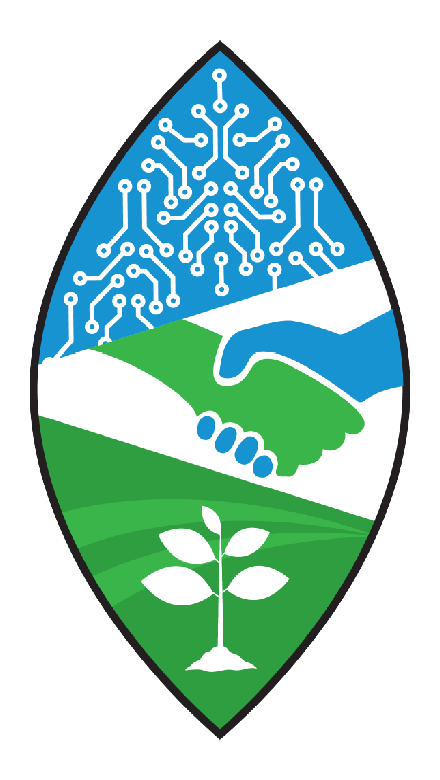
The Scientific Advisory Board (SAB) will link AIIRA to opportunities, guide grand challenge strategies, suggest course corrections, and enhance AIIRA visibility to a broader set of stakeholders and networks.
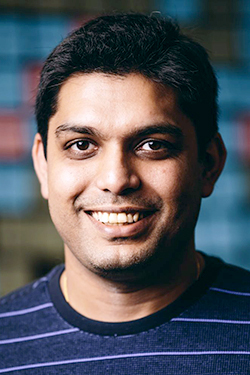
Ranveer Chandra is the Managing Director for Research for Industry, and the CTO of Agri-Food at Microsoft. He also leads the Networking Research Group at Microsoft Research, Redmond. Previously, Ranveer was the Chief Scientist of Microsoft Azure Global. His research has shipped as part of multiple Microsoft products, including VirtualWiFi in Windows 7 onwards, low power Wi-Fi in Windows 8, Energy Profiler in Visual Studio, Software Defined Batteries in Windows 10, and the Wireless Controller Protocol in XBOX One. His research also led to a new product, called Azure FarmBeats. Ranveer is active in the networking and systems research community, and has served as the Program Committee Chair of IEEE DySPAN 2012, and ACM MobiCom 2013.
Ranveer started the FarmBeats project at Microsoft in 2015. He is also leading the battery research project, and the white space networking project at Microsoft Research. He was invited to the USDA to present his work on FarmBeats, and this work was featured by Bill Gates in GatesNotes, and was selected by Satya Nadella as one of 10 projects that inspired him in 2017. Ranveer has also been invited to the FCC to present his work on TV white spaces, and spectrum regulators from India, China, Brazil, Singapore and US (including the FCC chairman) have visited the Microsoft campus to see his deployment of the world's first urban white space network. As part of his doctoral dissertation, Ranveer developed VirtualWiFi. The software has over a million downloads and is among the top 5 downloaded software released by Microsoft Research. It is shipping as a feature in Windows since 2009.
Ranveer has published more than 90 papers, and filed over 150 patents, more than 100 of which have been granted by the USPTO. His research has been cited by the popular press, such as the Economist, MIT Technology Review, BBC, Scientific American, New York Times, WSJ, among others. He is a Fellow of the IEEE, and has won several awards, including best paper awards at ACM CoNext 2008, ACM SIGCOMM 2009, IEEE RTSS 2014, USENIX ATC 2015, Runtime Verification 2016 (RV'16), ACM COMPASS 2019, and ACM MobiCom 2019, the Microsoft Research Graduate Fellowship, the Microsoft Gold Star Award, the MIT Technology Review's Top Innovators Under 35, TR35 (2010) and Fellow in Communications, World Technology Network (2012). Ranveer has an undergraduate degree from IIT Kharagpur, India and a Ph.D. from Cornell University.
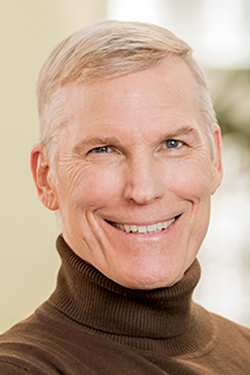
Dr. Joe Cornelius is the chief executive officer for Bill & Melinda Gates Agricultural Innovations, known as Gates Ag One, which aims to ensure high-quality, cutting-edge crop innovations are available and accessible to small holder farmers in developing countries. Joe began his career on a small family farm and now brings more than 30 years experience and a continued dedication to improving the world through agricultural advancements.
Prior to leading Gates Ag One, Joe served as a director for Bill & Melinda Gates Foundation's Global Growth & Opportunity Division and as program director for the Advanced Research Projects Agency in the U.S. Department of Energy, where he led transformational platform efforts in computational agriculture, smart-farm technologies and the sustainable management of carbon, nitrogen, and water to improve terrestrial and marine ecosystems while mitigating greenhouse gas fluxes into the atmosphere.
Joe has led cutting edge life-science research and development for companies like Bayer, Monsanto, Pfizer, and BASF. Notably, Joe collaboratively developed and launched over 75 new product inventions and 8 Ag-Tech start-ups across 60 countries.
Joe holds a Ph.D. in plant genetics and molecular biology and a MS in plant physiology and biochemistry from Michigan State University.
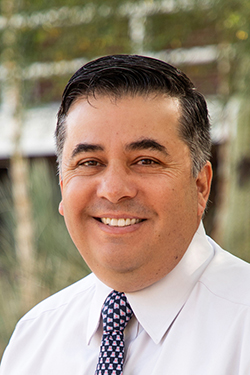
The Honorable N. Levi Esquerra (Chemehuevi) is the first University of Arizona first Senior Vice President for Native American Advancement and Tribal Engagement. In this position, he coordinates University-wide efforts to advance Native American programs and tribal engagement in consonance with the strategic plan. He serves as a point of contact for Native issues and as a liaison between the University and tribal governments and regional and national tribal organizations.
Esquerra has nearly three decades of experience facilitating and promoting Native American advancement and economic development for Native Nations, including two years as Chairman of the Chemehuevi Indian Tribe and three additional terms on the Tribal Council. Most recently, he served as Director of the Center for American Indian Economic Development and the Rural Policy Institute, both in the Alliance Bank Economic Policy Institute, which is part of Northern Arizona University's W.A. Franke College of Business Administration. His experience also includes several other community and economic development roles with the state of Arizona, St. Louis Community Development Agency and American Indian Center of Mid-America, as well as work to address the needs of indigenous tribes in Argentina while representing the U.S. Department of State. His expertise also led to the Canadian Consulate inviting him to participate in the annual Canadian Indigenous Conference where he shared best practices with First Nations communities. As an elected leader, Esquerra helped shape the Nuwuvi Economic Development Corporation, which creates, manages, and develops tribal enterprises to promote economic self-sufficiency through business development, job creation and revenue production.
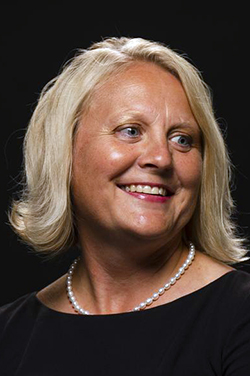
Shannon Hauf is currently Senior Vice President and Head of Crop Technology Soybean at Bayer Crop Science. Shannon and her team have management responsibility in leading the portfolio strategy for soybean to identify needs of farmer customers, define product concepts, ensure successful product development and launch, identify new opportunities, and prioritize resources and investments globally to deliver tailored solutions. Previously she was Vice President and Global Technology Lead, Cotton, Wheat, and Specialty Crops, at Monsanto Company.
Shannon joined Monsanto in 2003, and has held various roles of increasing responsibility within the Commercial and Technology Organizations. While in the U.S. commercial field sales and technical organization, Shannon was involved in the launch of a number of corn and soybean products, including YieldGard corn rootworm in Iowa resulting in rapid transition to triple-stacked products and earning #1 brand share of market. In 2008, Shannon moved to St. Louis as U.S. Chemistry Systems Team Lead followed by a move into the U.S. Cotton Product Management Team. She focused on leading efforts in managing the challenges of glyphosate-resistant Palmer pigweed, building relationships and alignment with external stakeholders, and launch of Roundup Ready Plus program. In 2012, Shannon moved into the Global Dicamba Product Management Lead responsible for coordinating cross-organization efforts to deliver Roundup Ready Xtend Crop System globally and building a global dicamba chemistry supply strategy. In 2016, Shannon was involved with two key company strategic alliances, one with Forage Genetics, a Land O'Lakes company on alfalfa biotech traits, and the second with Teays River Investments on a joint venture for sorghum. Shannon is the recipient of the Technical Excellence, Distinguished Development, and Pledge Awards, along with YWCA Women Leaders in the Workplace.
shannon serves on the Board of Directors for Innovative Seed Solutions, LLC, Iowa State University Research Foundation, and the Monsanto Citizenship Fund. She is the executive sponsor for Women in Research and Development, and sits on the United Way Women's Leadership Team. Shannon participates as a mentor with Global Giveback Circle, and is active in support of Adopt-A-Family and serves as a 4-H Leader.
Shannon grew up on a corn, soybean, and livestock farm in Southern Minnesota. Shannon has a B.S. from Iowa State University, and M.S and Ph.D. degrees from North Dakota State University. Shannon and her husband Darrin, and children Carter and Ella live on a farm near St. Louis, Missouri.
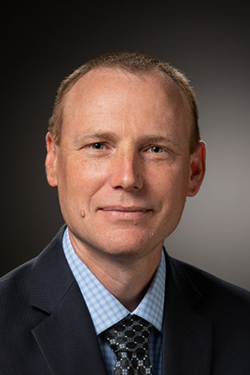
Jahmy Hindman is Chief Technology Officer of Deere & Company,
a position he has held since July 2020. Hindman is responsible for building Deere’s tech stack,
the company's intuitive end-to-end equipment solution made up of hardware and devices, embedded software,
connectivity, data platforms, and applications. He will lead the company's Intelligent Solutions Group,
the global network of technology/innovations centers, and the shared engineering function.
Working in both the Agriculture & Turf and Construction & Forestry divisions, Hindman brings more than 20 years of advance technology, artificial intelligence, product engineering, and manufacturing experience to the role. Most recently, he led the engineering team for Deere's flagship tractor product line.
Hindman joined John Deere in 1996 as a test engineer, working on backhoes and crawlers. Since then, he's been in leadership roles such as Global Manager, Architectures, Systems and Modules; platform architect for the tractor product lines; Manager, Large Tractor Chassis; general manager and engineering manager at Deere's construction-equipment factory in Tianjin, China; and product marketing manager and engineering supervisor for four-wheel-drive construction loaders.
Hindman holds a bachelor's degree in mechanical engineering from Iowa State University as well as master's and doctoral degrees in mechanical engineering from the University of Saskatchewan. His doctorate focused on the application of artificial neural networks in heavy-equipment applications. He currently sits on the Industrial Advisory Council for Iowa State University's College of Engineering.
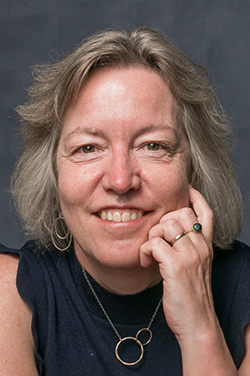
Catherine L. Kling is a Tisch University Professor in the Dyson School of Applied Economics and Management and Faculty Director at the Atkinson Center for a Sustainable Future at Cornell University. She is past Director of the Center for Agricultural and Rural Development at Iowa State University where she also held the President's Chair in Environmental Economics. She was elected to the National Academy of Sciences in 2015. Kling has published nearly 100 refereed journal articles and books chapters which have received over 8000 (google scholar) citations and is the editor of the Review of Environmental Economics and Policy. She specializes in the economic valuation of ecosystem services and integrated assessment modeling for water quality modeling. Her research program has received over $7 million in funding from the National Science Foundation, the US Department of Agriculture, the Iowa Department of Natural Resources, the US Environmental Protection Agency (EPA), among others. Kling chairs the Water Science and Technology Board of the National Academy of Sciences and has been a member of six National Research Council studies. She served as president of the Association of Environmental and Resource Economists, has held editorial positions at ten economics journals, and has received seven awards from professional associations for her research. She is an elected Fellow of the Association of Environmental and Resources Economists, the Agricultural & Applied Economics Association, and a University Fellow at Resources for the Future. She served for ten years on EPA's Science Advisory Board.
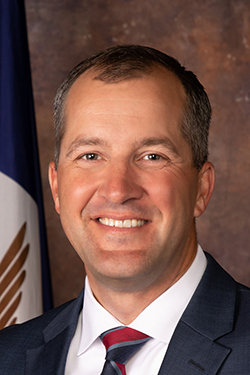
Mike Naig proudly serves as Iowa's Secretary of Agriculture.
Early in his life, Mike learned the value of hard work from his dad and uncle on their crop and livestock farm near Cylinder, Iowa. Mike has spent his entire career working in agriculture and is inspired by the passion and commitment of the hard working men and women who keep us fed and fueled. As the fourth generation from his family's farm, Mike understands rural Iowa and the importance of caring for the land while ensuring that Iowa farms provide a great living for farmers.
Mike joined the Iowa Department of Agriculture & Land Stewardship in 2013 as Deputy Secretary to former Secretary Bill Northey. As Deputy, Mike was responsible for overseeing the operations of the Iowa Department of Agriculture and Land Stewardship through development of policy and responsibility for budget and personnel. One of his involvements at the Department of Agriculture and Land Stewardship has included working towards developing an intensive plan that utilizes research and lays out steps that improve water quality and soil health. As the Deputy, Mike has lead multiple trade missions around the world, advocating for Iowa agriculture, both domestically and internationally. He knows the importance of building strong relationships and works with industry leaders to strengthen trade agreements and all markets that positively impact farmers.
Mike was appointed to the position of Secretary by Governor Kim Reynolds on March 5, 2018 when his predecessor, Bill Northey, was confirmed by the U.S. Senate to serve as USDA Undersecretary. He was elected to a full term on Nov. 6, 2018.
Mike is a graduate of Buena Vista University in Storm Lake with degrees in biology and political science. Mike and his wife Jaime have three boys: Mitch, Zach, and Joe. They are both active members of the Zion Lutheran Church and are active within their community. Mike and Jaime spend as much time as possible on the Naig family century farm in Northwest Iowa, teaching their boys the lessons and values that come with being involved on a generational Iowa farm.
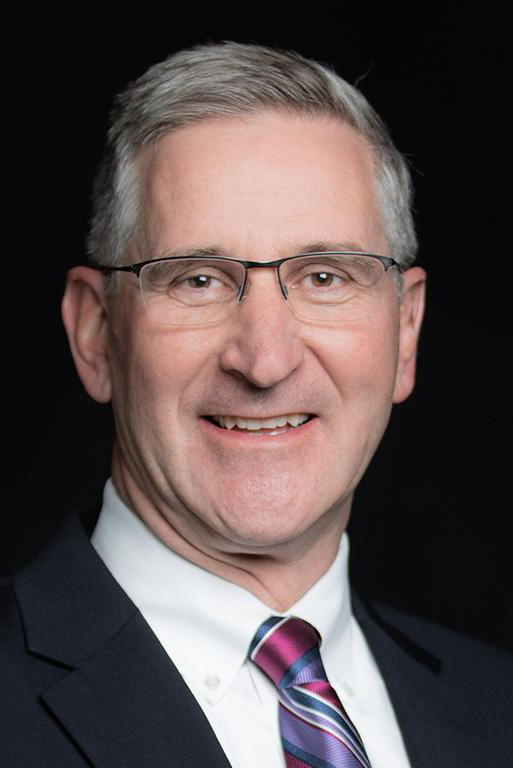
Governor Tom Wolf nominated Russell C. Redding to serve as the 26th Secretary of Agriculture for the Commonwealth of Pennsylvania in January 2015, and was confirmed by the Senate on May 14, 2015. Redding is the former dean of the School of Agriculture and Environmental Sciences at Delaware Valley College.
Redding has extensive experience as a public servant, having spent more than 20 years serving Pennsylvania in Harrisburg and Washington D.C. He worked on Capitol Hill as Ag Policy Advisor to U.S. Senator Harris Wofford and served for 16 years in the Pennsylvania Department of Agriculture, serving as secretary from 2009-2011 under Governor Rendell.
He is a graduate of Penn State, having earned his B.S. in Agriculture Education and M.S. in Agriculture and Extension Education. In addition, he is a graduate of the Agribusiness Executive program.
A native of Pennsylvania, Redding has an innate understanding of production agriculture, stemming from his youth on his family's dairy farm and his time as a dairy farm operator. He currently serves as Chair of the USDA Advisory Committee on Biotechnology and 21st Century Agriculture.
Russell, his wife Nina and sons Garrison and Elliot reside in the Gettysburg area, where the family is active in the community, their church and the local 4-H Club.
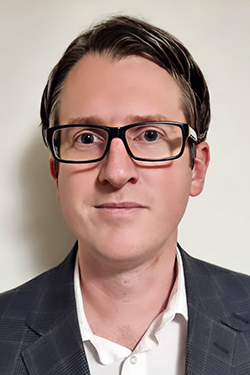
MJ (Mark) Ryan is a Digital Ethics Researcher at Wageningen Economic Research, focusing on areas or robotics, AI, and digital developments and responsible innovation. Previously, he was a Postdoctoral Researcher at the Department of Philosophy, KTH Royal Institute of Technology, Stockholm. He also worked on two large H2020 projects: the SHERPA project (2018-2021, budget €3 million) focuses on the ethical, social and human rights implications of smart information systems (data analytics and artificial intelligence); and the MARIO project (budget €4 million, 2015-2018), which assessed the difficulties of loneliness and isolation among people with dementia and the possibility of using service robots to ameliorate some these issues. He have published on a wide range of digital ethics topics, such as: smart cities, self-driving vehicles, agricultural.
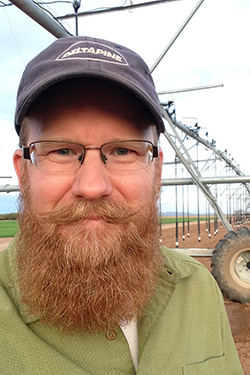
Dr. Kelly Thorpe's research focuses on the development and application of informational technologies to understand cropping system processes, improve management of water and nutrients for crop production, and enhance plant breeding and genetics research. A key emphasis is the collection and processing of radiometric data and remote sensing images to map crop and soil spatial variation, including new efforts using unmanned aerial systems (UAS) and applications of hyperspectral remote sensing in the visible, near-infrared, and short-wave infrared wavebands. Dr. Thorpe also develops, evaluates, and applies cropping system simulation models, including the Cropping System Model (CSM) as distributed with the Decision Support System for Agrotechnology Transfer (DSSAT) and others. Efforts are currently focused on the development of modeling methodologies that integrate remote sensing and soil moisture data for improved cotton irrigation management. Other interest areas include crop water and nitrogen status assessment, precision agriculture, management of nitrogen fertilizer, irrigation and drainage water management, field-based plant phenomics, and development of new bioenergy crops.

